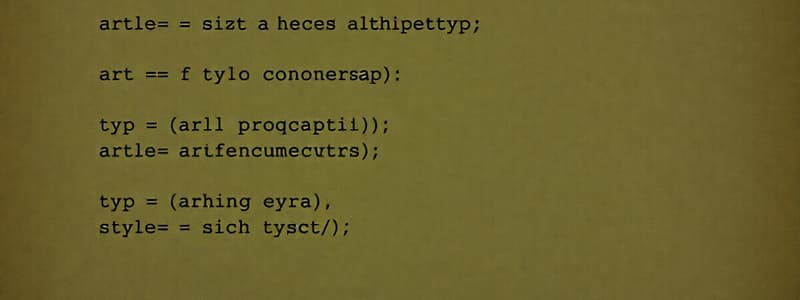Podcast
Questions and Answers
What is the value of c after executing the following code snippet?
int a = 5, b = 2, c;
float f1 = 1.5;
c = a + f1;
What is the value of c after executing the following code snippet?
int a = 5, b = 2, c;
float f1 = 1.5;
c = a + f1;
- 7.0
- 6.5
- 6 (correct)
- 7
Which of the following statements best describes the potential issue with floating-point arithmetic?
Which of the following statements best describes the potential issue with floating-point arithmetic?
- Floating-point operations are slower than integer operations.
- Floating-point operations are always exact, but can lead to overflow errors.
- Floating-point operations can only be performed on certain hardware.
- Floating-point operations can suffer from precision loss. (correct)
Given int a = 2147483647;, what is the most likely outcome of the operation int b = a + 1;?
Given int a = 2147483647;, what is the most likely outcome of the operation int b = a + 1;?
- An overflow will occur, leading to an unexpected (likely negative) value for `b`. (correct)
- `b` will equal `2147483648`.
- The program will crash.
- A compilation error will occur.
What is the value of b after the following code is executed?
float f2 = 3.6;
int b = (int) f2;
What is the value of b after the following code is executed?
float f2 = 3.6;
int b = (int) f2;
Which of the following scenarios will result in a loss of precision?
Which of the following scenarios will result in a loss of precision?
Which of the following operations will be computed at compile time rather than runtime?
Which of the following operations will be computed at compile time rather than runtime?
What is the result of the expression 5 / 2 in a programming language where both operands are integers?
What is the result of the expression 5 / 2 in a programming language where both operands are integers?
Which of the following statements is correct regarding arithmetic operations on different data types?
Which of the following statements is correct regarding arithmetic operations on different data types?
What will be the data type of the result of the following operation: double x = 5.0; int y = 2; double result = x / y;?
What will be the data type of the result of the following operation: double x = 5.0; int y = 2; double result = x / y;?
Which operator is used to find the remainder of a division operation?
Which operator is used to find the remainder of a division operation?
Consider the expression (5 + 3) * 2 - 4 / 2. What is the correct order of operations according to operator precedence?
Consider the expression (5 + 3) * 2 - 4 / 2. What is the correct order of operations according to operator precedence?
If a = 5 and b = 2, what is the value of a / b + a % b?
If a = 5 and b = 2, what is the value of a / b + a % b?
Flashcards
Operators
Operators
Symbols that perform specific mathematical or logical actions on values.
Operations
Operations
Actions performed using operators on operands (variables or values).
Expressions
Expressions
A combination of operators and operands that results in a value.
Arithmetic Operators
Arithmetic Operators
Signup and view all the flashcards
Modulus Operator (%)
Modulus Operator (%)
Signup and view all the flashcards
Compile-Time Evaluation
Compile-Time Evaluation
Signup and view all the flashcards
Runtime Evaluation
Runtime Evaluation
Signup and view all the flashcards
Type Conversion
Type Conversion
Signup and view all the flashcards
Forced Conversion (Type Casting)
Forced Conversion (Type Casting)
Signup and view all the flashcards
Implicit Casting
Implicit Casting
Signup and view all the flashcards
Overflow
Overflow
Signup and view all the flashcards
Underflow
Underflow
Signup and view all the flashcards
Relational Operators
Relational Operators
Signup and view all the flashcards
Study Notes
Operations, Operators, and Expressions
- Arithmetic operations include multiplication (*), division (/), addition (+), and subtraction (-).
- Operands can be basic data types like char, int, float, and double.
- Operations return results of the same data type as the operands.
- The modular operator (%) is used with integer data types, char, int, and long.
- Examples of syntax include:
a * b,a / b,a + b,a - b,a % b. - Constant operations are evaluated by the compiler during compile time.
- Operations involving variable operands are computed at runtime, with the compiler generating instructions.
- Arithmetic operations on the same data types return the same data type i.e., int/int gives int like 5/2 producing 2.
- Operations on different data types will result in a type conversion from low to high type before computing.
- Type conversion refers to changing one date type to another.
- Data types ordered low to high: char, short, int, long, float, double.
- Forced conversion (type casting) explicitly tells the compiler to convert data with the syntax
(datatype). - Overflow occurs when the operation result is beyond the data type's range.
- Underflow (floating point) occurs when the operation results in a value smaller than float or double type.
- Operations on non-floating types are correct if there are no overflows.
- Operations on floating-point types may cause precision loss; correctness is measured by tolerance.
Relational Operations
- Relational operators are <, >, >=, <=, ==, and !=.
- Operands can be of data types as char, int, float, and double.
- Operations return an integer value of 1 if true and 0 if false.
Logical Operations
- Logical operators include && (AND), || (OR), and ! (NOT).
- Operands are primary type values, valued as 1 if not 0, or 0 otherwise.
- Operations yield 1 if true or 0 if false.
Bitwise Operations
- Bitwise operations work on every bit of operands.
- Bitwise operators are &, |, ^, ~, <<, and >>.
- Operands and results are of unsigned types.
- Bitwise operation operates on bit patterns at their individual bit level.
- Bitwise operations are primitive ones supported by processors.
- They are used to create other operations by algorithms in software, and used to represent states or flags efficiently.
Unary Operators
- C has three unary operators: unary minus (-), increment (++), decrement (--).
Conditional (Ternary) Operators
- Acts like an
if...elsestatement but can be written within expressions. - The syntax takes the form
exp1 ? exp2 : exp3. exp1is evaluated first. If true,exp2is evaluated and becomes the result; otherwise,exp3is evaluated and becomes the result.
Assignment Operators
- The "=" operator assigns values to variables, C supports shorthand assignments.
C Operations and Expressions Summary
- C has four operation types: arithmetic, relation, logic, and bitwise, each containing operator groups.
- Expressions are built using any operator with any expressions as operands, and parenthesis for precedence is allowed.
- Precedence of operators follows the order: (), *, /, +, -, bitwise operators, relational operators, logic.
- Parentheses are used to define operation order.
- Using parentheses and simple expression are good practices to determine computing order.
Flow Controls
- There are three flow control constructs: sequence, selection, and repetition.
- Special control statements are break, continue, and goto.
Sequence: Linear Order
- Instructions are executed in a linear order.
Decision (Selection, Branching)
- Alters the flow of a sequence of instructions, jumping from one part of the program to another depending on conditions.
- C has 4 decision control statements: if, if-else, if-else-if, and switch.
Repetition (Loop) Statements
- Executes a code block repeatedly until a condition is met.
- C has 3 types namely for, while, and do-while loops
For loop
- Takes the form:
for (initial statements; conditional statements; next-iteration statements) { repetition-block }. - Executes initial statements once, checks conditional statements, and executes the repetition block if true until the condition is false. Then, the compiler executes the list of next iteration statements and loops to checking conditional statements again.
While loop
- Takes the form:
while (list of expression){ repetition block} - Executes the expression list; the loop repeats while an expression is true (not 0).
Do-while loop
- Takes the form:
do {repetition-block} while (list of expressions) - Executes the repetition block before checking the expression list.
- Similar to the while loop, but the block executes at least once.
Break Statement
- When the compiler encounters a
breakstatement, control passes to after the block. - Used in a loop to terminate the execution and jump out of it, or used in a switch statement to exit it.
Continue Statement
- Only used in loop blocks.
- Skips the rest of the statements and transfers control to the loop-continuation portion of the nearest enclosing loop.
- In a for loop, the statement jumps to the next iteration statements.
Goto Statement
- Transfers control to a specified labeled position using the syntax
goto identifier. Identifierspecifies a label.- Can be used for selection and repetitio
Studying That Suits You
Use AI to generate personalized quizzes and flashcards to suit your learning preferences.
Related Documents
Description
Explore arithmetic operations and operands in programming. Learn about data types, type conversion, and constant vs. runtime evaluation. Understand the modular operator and syntax examples for various operations.




